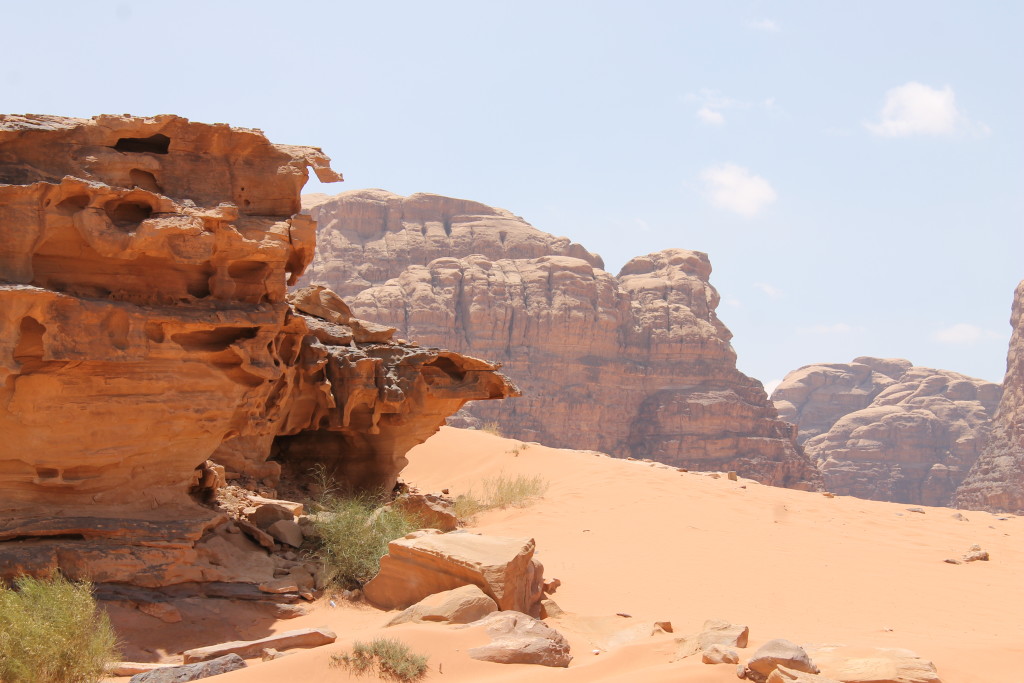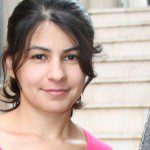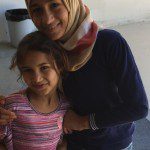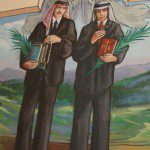The hair was white, coarse and yet surprisingly soft. The saddle was a simple blanket with a horn to grip and stirrups to aid in mounting. I had never been on a camel. It definitely wasn’t like riding a bike.
As I sat on the lumbering beast, I thought about how much the animal has meant to the people of the Middle East. Camels have been companions on long treks and have been a status and wealth. I think in a strange way, their grinning demeanor has provided a source of comfort and amusement to people going back thousands of years.
People of the desert
I was in the Wadi Rum desert of the Kingdom of Jordan, a guest of the Bedouin. These people are an ancient tribe — almost Abraham-ic in their lifestyle. Their black tents dot the landscape. They are beautiful people, with lively eyes and broad grins. Without stereotyping, their main industry seems to be herding goats or sheep. Across the hills of Jordan I’ve seen many boy or man stalking them, occasionally clicking a tongue or prodding them with an end of stick into their hindquarters. The women are often invisible, and when they are seen, they are modest, sometimes dressed head to toe in black. But I’m sure if could see their face, they would smiling.
I wonder if life must be difficult for these people. They carve out a simple existence in a modern world. The marketplace isn’t’ t conducive to trading in camel hair carpets or cured strips of lamb. But generation after generation continue to live the life. There is a modern world wide open to them, but most of them continue to choose family, tradition, and God.
A few Bedouin camps have opened their world to tourism. I was very cautious about invading or exploiting these people . But they seemed eager to show their life, proud of their goods and their ingenuity, and freely open up their private world to outsiders. It’s a necessity for them to continue their way of life, bringing in needed income. We are eager and curious and they are gracious and in need of economic support.
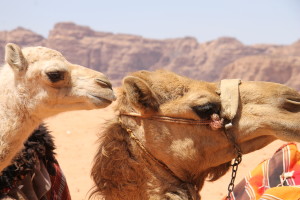 They took a group of us through the desert to what I called, “the camel corral” – only there was no fence. The animals don’t seem prone to wander. As a group, they knelt in humble unison, ready to serve their masters. I easily mounted the camel and he didn’t even seem to know that I was there. With a “click click” of the tongue of the young Bedouin, the camel grunted and showed his teeth, but then rose on command. Suddenly, I towered over the others.
They took a group of us through the desert to what I called, “the camel corral” – only there was no fence. The animals don’t seem prone to wander. As a group, they knelt in humble unison, ready to serve their masters. I easily mounted the camel and he didn’t even seem to know that I was there. With a “click click” of the tongue of the young Bedouin, the camel grunted and showed his teeth, but then rose on command. Suddenly, I towered over the others.
Our camel train numbered six, as a group of us were led through the canyon. A few of the others were laughing and singing old songs from American pop culture and riding the camels like a Disney ride. But once the giddiness of the new experience wore off, I began to retreat, taking in the moment.
For just a few moments the laughter and conversation stopped and I was struck by the silence. A bird chirped a distant cliff. A rock tumbled down into a pile. The sand buffered the heavy hooves and the only sound was the swaying of the saddle. But for the most part it was completely serene. Is that you God?
While I was experiencing the desert, I didn’t hear what I was supposed to hear until I just quit talking.
Silence. Simplicity. Peace.
What is like for Abraham, who left with his family to a land he knew not where he was going? What was it like for Joseph and Mary to travel to Bethlehem? What was it like for David, as he led the sheep? How about John the Baptist who nearly lived in the desert, or Jesus who spend 40 days completely alone with God? And Elijah on the run from Jezebel? What was it like to the people of Israel to walk in these lands for 40 years?
The dark nights and hot days were stifling. Unforgiving and oppressive, the desert has killed many a man, but have given a passageway for inspiration and clarity as no other place. Death and life have sprung from it’s sands.
The desert is undisturbed by distant highway noise or overhead jet traffic. It’s unspoiled by screeching brakes and horns. In it’s purest form, it’s the place where God speaks – Just read the Psalms or the prophets. That’s why so many of God most important moments happened in the desert.
The desert is waterless, and survival depends on finding the next watering hole – hope. Stripped away of encumbrance. It’s where we can hear God, if we will actually be quiet and listen.
Me. A camel. And God.
Here I am.


